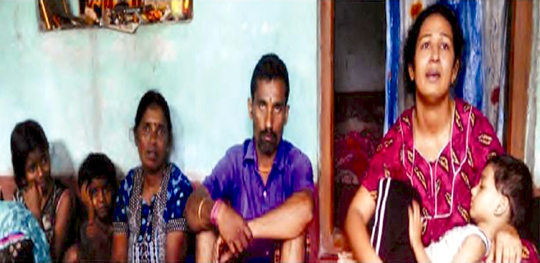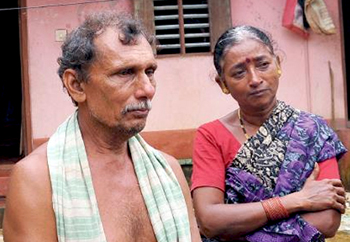Udupi, Aug 19: Two days after Praveen Poojary, a BJP?worker, was killed by miscreants belonging to Hindu Jagarana Vedike and other Hindutva outfits while transporting cattle on Wednesday, the family of the victim has denied the charge that he was involved in cattle trafficking.

Prameela Poojary, the sister of the Praveen, told media persons on Friday that her brother was never involved in cattle trafficking. “If that was the case, we would have been rich years ago itself. The people whom he believed stabbed him in the back,” she said. She claimed that the people who did not tolerate her brother's popularity in the village were behind his murder.
Praveen's father Vasu Poojary said that his (Praveen's)?friends were the main culprits. “He trusted people too much. They cheated him,” he said.

Udupi district BJP?president Matter Ratnakar Hegde said he personally believed that Praveen had been murdered for “personal reasons.”?Former district BJP president, Tingalay Vikramarjuna Hegde, said that the murder had nothing do with the party. He said that people who brand themselves as cattle protectors were no way connected with the party.
Superintendent of Police K?T?Balakrishna said that according to the preliminary investigation, Poojary was killed over cattle trafficking. “The suspects claim that they murdered Poojary as he was transporting cattle. But, it is yet to be ascertained whether the he was done to death owing to personal enmity,” the SP?said.
Poojary, 29, was bludgeoned to death by a gang while transporting cattle in his mini truck under the limits of Hebri police station in Udupi district on Wednesdaynight. His friend, Akshay Devadiga, was injured in the murderous attack and he is under treatment in a private hospital in Brahmavar.
Akshay Devadiga, who spoke to media persons, said that a gang of around 25 men attacked him and Praveen with iron rods when the vehicle by which they were transporting calves stopped near Muddur. Ramesh, the person who had hired the vehicle, fled the spot as soon as the gang struck them, Devadiga said.
“We were dumped along with the calves in the truck. I lost consciousness after the attack and when I regained senses, I?heard Praveen screaming for water. The assailants told him to drink rain water and die. Later, some local people, who arrived at the spot, threw a water bottle at him. I put a few drops of water into his mouth. The police shifted us to a hospital,” he recalled.
18 remanded to judicial custody
A local court in Udupi has remanded 18 suspects arrested on Thursday in connection with the murder in judicial custody till August 30. The other seven suspects, who were produced before the magistrate at his house on Friday evening, were sent to judicial custody till August 31.
Also Read:
Some Sangh Parivar activists indulging in illegal cattle trade: Former BJP MLA
After BJP worker's murder, Hindutva groups disown Udupi cow vigilantes
Those Hinduvta activists too should meet similar fate: Slain BJP worker's mother
'Cows rescued' by vigilantes in coastal Karnataka end up in slaughterhouses'




Comments
we welcome poojary family to indian national congress
P Bhatt : Im happy my family did not suffer
PravTogadia : I give speeches to people not for my family. My family doesnt involve in this evil acts of killing and looting.
YOGI : Let them kill each other. We dont suffer
Prachi : Its easy to fool with Orange Cloths cos our BD / VHP members doesnt want to know what the scriptures really talk about Cows and beefs.
VJP : Lets be silent now .. once the damage is done.. Lets go to the STREETS making bow bow...
Hope our intelligent humans understand what they all intend in their real life... Life is not a play ... Life is precious and fragile...will b accounted with the one who gave us this life...
Add new comment